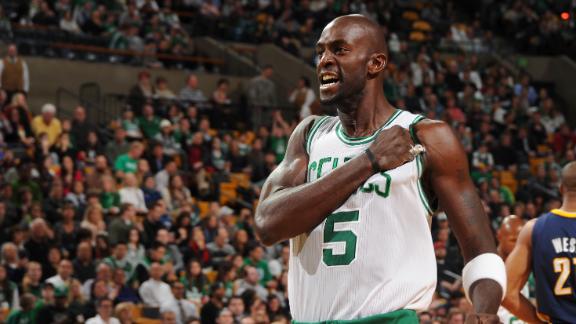 |
| KG showing K-Love he's still the alpha-T'Wolve. |
Kevin Garnett is 35 years old. He can no longer rely on pure quickness to take him from one side of the lane to the other to draw a charge, yet he gets there when he needs to. Like a right fielder who knows his corners and alleys through experience, KG finds himself in positions that hurt the other team's chances of scoring, positions no other player in the league, however young or quick, would reach.
This isn't a renaissance year for The Kid- more of a "keep plugging away with remarkable consistency" year. He's averaging 15.7 points, 8.2 rebounds, three assists, one steal and 1.1 blocks in 31.1 minutes per game, numbers with small deviations from what he has produced since 2009. Boston has finally taken over first place in the competitive Atlantic Division, and Garnett's consistent presence has been a huge reason amidst roster turnover, old age, the enigma that is Rajon Rondo, and injury to Ray Allen.
The Celtics lack length outside of KG in their frontcourt- 6'8 Brandon Bass gets major minutes at the other frontcourt spot- and defensive genius Tom Thibodeau isn't crafting their defensive schemes anymore, yet Garnett is still anchoring the third-best defense in the league. He's sixth in defensive rebound percentage (25.8). And he improves Boston's defense by more than four points per 100 possessions. If he were capable of playing more minutes, he'd be getting legitimate DPOY consideration. Maybe he should as is.
 |
| KG has been Boston's MVP this year. |
His impact is felt on offense, too, particularly with Rondo leading the way for Boston. Because Rondo is such a putrid scorer, defenses ignore him when he doesn't have the ball; therefore, it's important that he plays with players who can capitalize off of Rondo handling the ball.
Enter Garnett, one of the best stretch bigs in the game. This year, Garnett is taking 5.4 shots from 16-23 feet and converting them at an astounding 49 percent clip. Roughly 90 percent of his makes are assisted.
And as Love can attest to, KG's mid-post iso game continues to be a weapon for him.
KG still has the bark to intimidate small, defenseless European point guards; more importantly for Boston, he can still summon the bite from his old T'Wolve days.






